The Arzner cinema: 'It's a judgement-free zone'
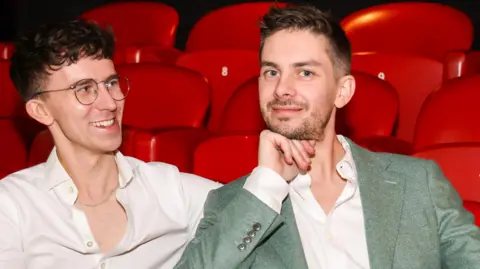 Tom Dingley/ The Arzner
Tom Dingley/ The ArznerIn the words of the owners of a newly-opened cinema in south London: "We have a very niche offering, but a very dedicated audience".
The Arzner, in Bermondsey Square, is billed as the only cinema in the capital dedicated solely to screening LGBTQ+ films, and Piers Greenlees and Simon Burke hope it will become a "safe, creative space for the queer community".
It will offer a mix of cult classics, indie favourites and festival hits which are all about, by, or related to the LGBTQ+ community.
Mr Greenlees and Mr Burke, the Arzner's co-founders, said people could "come and watch queer cinema any night of the week".
The pair, who have known each other for more than 10 years, already own the Rising, a queer-focused pub in Bermondsey which opened in April last year.
They want the Arzner to be a space that isn't heavily focused on drinking - although the cafe bar does offer bespoke cocktails named after Golden Age Hollywood icons like Rock Hudson and Marline Dietrich.
Mr Greenlees said the venue created a pressure-free environment for all: "You can come as you are, it's a judgement-free zone."
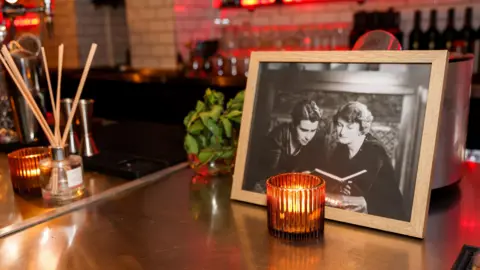 Tom Dingley/ The Arzner
Tom Dingley/ The ArznerThe cinema's programming consists of films related to LGBTQ+ experiences or made by queer individuals but are also "interesting films that will appeal to a much wider audience as well".
Cult classics like Jennifer's Body and Girl, Interrupted are on the schedule, as well as more recent awards season offerings such as Call Me By Your Name and Moonlight.
Classic films - think the Wizard of Oz and Sunset Boulevard - also feature.
Mr Burke said he and Mr Greenlees have responded to a demand for more queer spaces - and audiences wanted to watch films not often shown in mainstream big screen cinemas.
London-based film critic Jasmine Valentine said there was a distinct lack of permanent, LGBTQ+ creative spaces in the city.
Although there are increasingly more queer films and filmmakers operating in Hollywood, the screenings themselves are still often limited to film festivals like BFI Flare, or curated seasons at mainstream venues.
"We've never had an LGBT cinema before. We've had places that have done festivals or they've done pop-up events, but they've never been permanent. It's always been temporary," she said.
She added: "As a queer woman myself, it's that you don't have a permanent space in the city, it's either a fleeting event that's on for a week, or it's somewhere that gets shut down or the funding stops.
"So for this to come along and say, 'yes, we're going to be here, this is our art, and we're going to be here permanently for the LGBT community and for London', I mean, we couldn't ask for more."
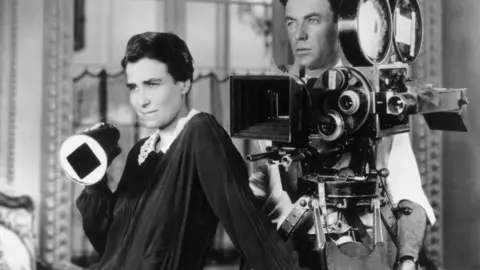 Getty Images
Getty ImagesDorothy Arzner
The cinema is named after Dorothy Arzner, the only female director working in Hollywood from 1927 to 1943.
She was in a public relationship for 40 years with choreographer Marion Morgan and had a significant - yet little known - contribution to Hollywood history, having invented the boom mic, discovered actresses Katherine Hepburn and Lucille Ball and taught Godfather director Francis Ford Coppola.
Many of Arzner's films had a theme of unconventional romance: The Wild Party is about a college student who is attracted to one of her teachers, Honor Among Lovers is about a businessman attracted to his secretary, and Christopher Strong is a tale of illicit love among the English aristocracy.
Mr Greenlees said they wanted to put Dorothy Arzner "front and centre" of the only queer cinema in London and naming the cinema was about "being proud in who we are and the entertainment we provide".
Mr Burke also hoped that using her name and likeness would help attract wider audiences.
He said: "There's quite a lot of focus on gay male spaces and we want this to be a very diverse and mixed space and the lesbian voice in that is really important.
"Hopefully that will feed into the demographic of people we're here to serve."
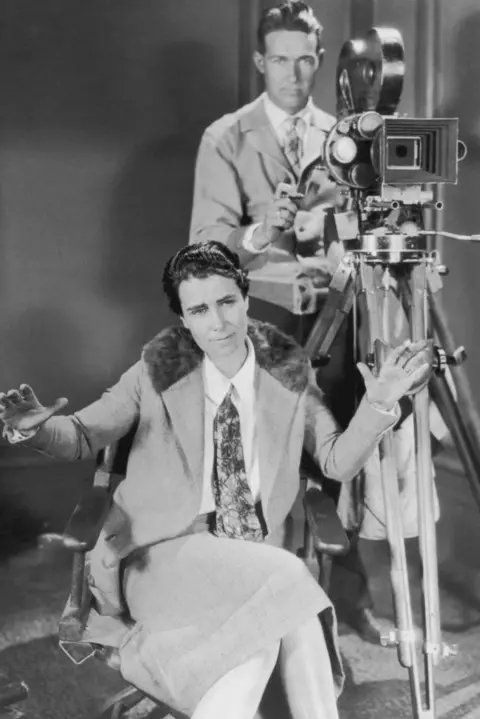 Getty Images
Getty ImagesAccording to the 2023 census, Bermondsey is home to the highest number of LGBTQ+ people in London, and the Arzner has already been embraced by the community.
Erin McKeown, who moved to the area two years ago, said: "This is on my doorstep and kind of brings everything that I love together in one place - queer cinema, building queer community, and having lovely cocktails on the side.
"It is basically everything that I could want and hope for in a queer space."
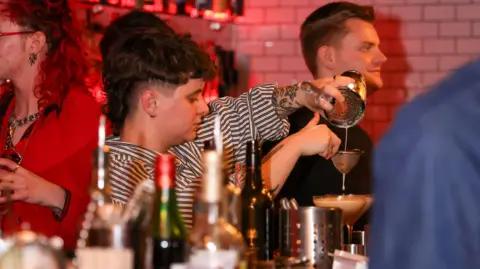 TomDingley/ The Arzner
TomDingley/ The ArznerThe Arzner is already receiving international attention, with visitors coming from the Netherlands and messages from America and Asia.
"They want to know how they can get involved - if their films can be shown here - so seeing that response from both the community and the industry has been just phenomenal," said Mr Greenlees.
Globally, box office revenue is declining and London venues like the Prince Charles Cinema have come under threat, Mr Burke and Mr Greenlees are optimistic they are here to stay.
"We've put quite a lot of time into the business plan of this space to make sure that we're here for the community and that we can thrive here.
"We absolutely see this as a commercially viable as well as a culturally important space."
